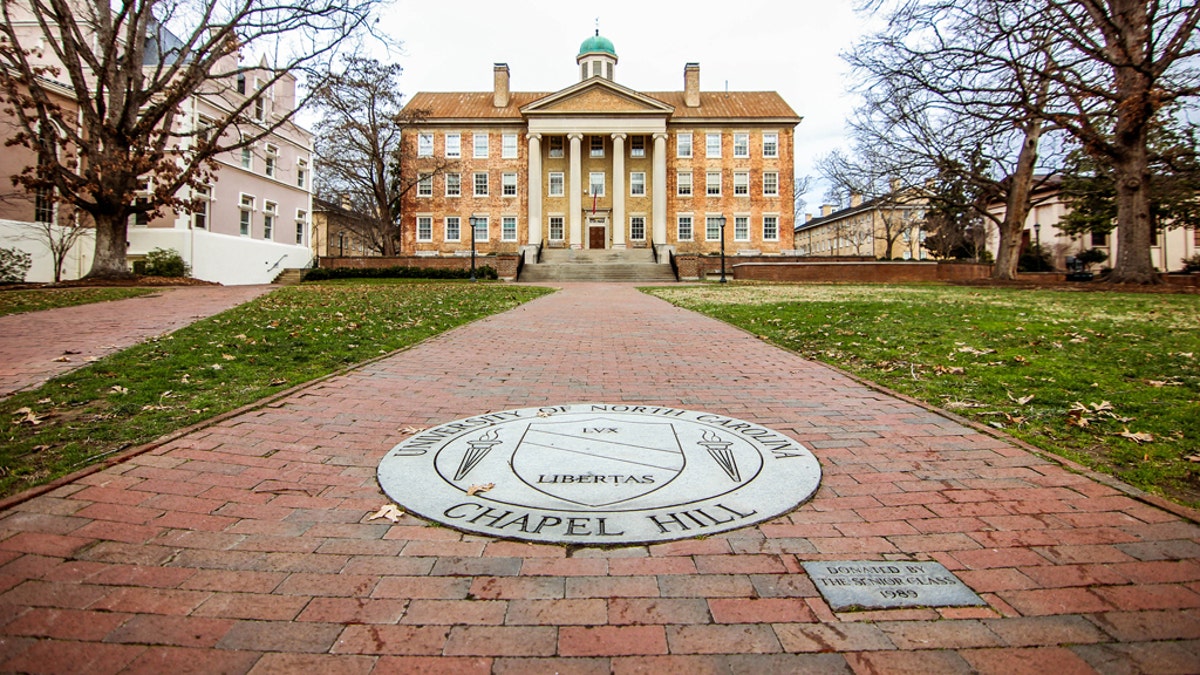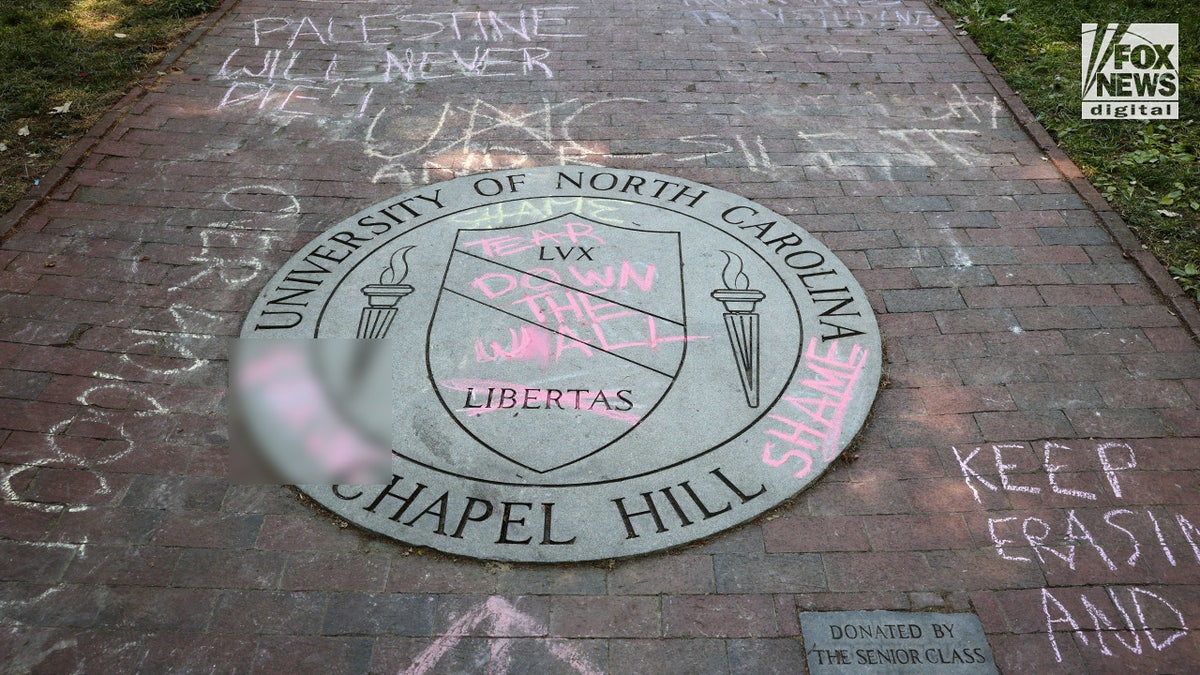Free inquiry hits headwinds at the University of North Carolina
An accreditation agency muscles into a new-school fight.
The University of North Carolina is attempting to restore uninhibited free speech and civil discourse on campus through its new School of Civic Life and Leadership amid an increasingly politically polarized academic climate.
The newly established School of Civic Life and Leadership (SCiLL) at the University of North Carolina-Chapel Hill, which was launched in part to foster free speech on UNC's campus, has faced criticism from students and professors. But John P. Preyer, chair of UNC-Chapel Hill Board of Trustees, told Fox News Digital that the goal of the new school is to promote public discourse, civic life and leadership regardless of politics.
SCiLL is offering its inaugural round of classes this fall semester, which will teach students the skills and techniques necessary to engage in civic engagement and reasoned debate, including oral presentation, resolution of misunderstanding, as well as the skills to navigate challenging conversations for faculty and students, according to the school's website. The school will also host a "high-profile fellows program for semester-long conversations on challenging topics with multiple, even contentious, perspectives."
"In an increasingly divisive time with polarization on both sides of the political spectrum, now more than ever, we need to teach our students how to think critically and how to reason and argue their points with their peer group in a constructive way," Preyer told Fox News Digital. "That's not been happening on college campuses. This is an opportunity for the University of North Carolina to lead nationally and help restore civil debate in a way that is needed not only on campus but in our country."
The move by the nation’s oldest public university follows a series of campus controversies that received national attention. Earlier this year, a group of UNC fraternity members gained widespread notoriety for their patriotism, amid ongoing protests on campuses across the country over the Israel-Hamas War, when they held up the American flag as anti-Israel protesters tried to replace the Stars and Stripes with a Palestinian flag.
Before that, in June 2023, the school made waves when its medical school disbanded its diversity, equity and inclusion (DEI) task force without implementing its recommendations just months after it banned DEI statements from admission, hiring, promotion and tenure campus wide. In August, following the monumental decision by the Supreme Court to overturn affirmative action in college admissions in which UNC was a defendant, the school announced it would no longer use race as a factor in its admissions and hiring decisions, including in the applications essays.

Anti-Israel protestors have been causing campus unrest at the University of North Carolina since last school year. The "Gaza solidarity encampment" seen here was removed by police in April. (Travis Long/News & Observer/Tribune News Service via Getty Images)
Conservative activist Kenny Xu described SCiLL as "the most ambitious plan yet in American higher education to develop a school to prepare people to debate both sides of an opinion."
"UNC is pretty much a national hotbed of newsworthiness," Xu, Executive Director of Davidsonians for Freedom of Thought and Discourse, which focuses on free speech and intellectual diversity issues, told Fox News Digital. "I think students and faculty are starting to recognize that. If you're in the crosshairs of the national discourse, the need is extra high for you to build a school that can effectively navigate that discourse and the only way to effectively navigate that is through the lens of both sides."
"All the professors are extremely meritorious, all of them have advanced degrees from top universities and really, the purpose of this school is to attract a bunch of different viewpoints, including viewpoints that are not often heard on college campuses," he added. "It's likely to attract a lot of students from around the country just because students and people know, especially our generation knows, that schools most likely teach a one-sided, biased world view."
But some, like UNC history professor Jay Smith, claim the school is essentially "affirmative action" for conservatives, according to an op-ed he wrote for the student newspaper, the Daily Tar Heel.
"Though they would never admit it, the faculty of SCiLL benefited from affirmative action, but of the unjustifiable kind that works in reverse," he wrote. "Their candidacies for positions at UNC were made possible not by pure merit, which they may or may not possess, but by their membership in or adjacency to a well-funded conservative ecosystem saturated by euphemisms like ‘viewpoint diversity,’ ‘civility’ and ‘balance.’ That ecosystem thrives on other built-in advantages."
‘1619 PROJECT’ FOUNDER LOSES TENURE OFFER AMID CRITICISM: REPORT
"SCiLL's mission, like that of other similarly inspired centers across the country, is supported by the generosity of rich donors working to defend and disguise capitalism's worst excesses, a gerrymandered GOP supermajority in our state and a university administration willing to accommodate the political goals of legislators and their minions on governing boards," he added. "SCiLL professors may well be the most protected people on our campus."
Reached for comment, Smith told Fox News Digital, "Those of us who respect process, and who understand the importance of separation of powers in the context of effective university governance, will never accept the SCiLL as a legitimate institution…. A university is not a Frankenstein monster to which limbs can be attached willy-nilly. The limbs need to grow organically, as reflections of the disciplinary imperatives identified by faculty and the changing intellectual horizons of new generations of students."
Xu said it's "almost guaranteed" that some among UNC's faculty are going to oppose a lot of the messaging out of SCiLL, but applauded the Board of Trustees for their "courage" in proposing the idea and then defending it from "withering criticism" it has received in recent years.

South Building on the campus of UNC-Chapel Hill. (iStock)
"I think the hope of the trustees is that it becomes a model," Xu said. "A lot of university presidents are following the establishment of the school carefully. If UNC becomes successful at attracting student demand, high-quality professors and enhancing debate, I think other universities might follow through with that as well."
Although, Xu argued, "not everybody is in favor of such a school for intellectual diversity."
In April 2023, nearly 700 faculty members signed a petition that claimed "the interference and overreach of the North Carolina legislature, the UNC System Board of Governors, and the UNC-Chapel Hill Board of Trustees" violates "the principles of academic freedom and shared governance that undergird higher education in N.C. and the U.S."
The editorial board of the student newspaper also argued in a Sept. 15 editorial that SCiLL's real intentions are "controlling and informing public discourse on campus."
"The issue isn't a lack of civic discourse or engagement on UNC's campus — the issue that SCiLL is meant to address is that the civic discourse on campus tends to disagree with the Board of Trustees' political ideologies," the editorial read.
Preyer described that notion as "just silly on its face" because the SCiLL aims to "promote better understanding among students for how to reason and engage in civic debate in a way that's been lacking."
"The whole point of this is to not have it be politicized and for any professor to criticize it with that concern, I think they're betraying their own bias and prejudice about the type of views that they want represented," he said. "We have 4,000 plus or minus faculty at UNC, and we're talking about a couple of dozen critics whose spirit of tolerance and diversity is, ironically, not what they would like to think it is when it comes to the establishment of a new program [or] a new school that they immediately criticize it before it has really even come to fruition."
UNC RAGER DUBBED ‘FLAGSTOCK 2024,’ FUNDED BY GOFUNDME SLATED FOR LABOR DAY

The University of North Carolina Chapel Hill’s seal is covered in graffiti on Thursday, May 2, 2024. Students from the Pi Kappa Phi fraternity were commended by some after photos surfaced of them holding up the American flag during an anti-Israel protest. (The Image Direct for Fox News Digital)
Fewer than 10% of students at UNC Chapel Hill said it is "extremely clear" that the administration protects free speech on campus and 10% of students said they would feel comfortable publicly disagreeing with a professor about a controversial political topic, according to data collected by the Foundation for Individual Rights and Expression (FIRE).
"Every survey that the Foundation for Individual Rights has taken on the top schools shows that there's a lot of self-censorship and shows that there are certain perspectives that are accepted or not," Xu said. "We grew up in the age of the Internet, we grew up in the age of Twitter and X. The student demand for such a college, I think, is to the point where you can't ignore that."
While UNC already had the Program for Public Discourse, Preyer said it has not been as successful as was intended, but served as a framework to move forward with SCiLL.
"The Board of Trustees felt it important that it be formalized with the creation of a new school with a specific curriculum devoted to bringing students together to explore how to reason and engage in civil debate," he said, in an effort to "get away from the sort of canceling of a contrary view."
CLICK HERE TO GET THE FOX NEWS APP
"Students are the ones that are quick to want to curtail the free flow of dialogue and debate and I think that that's a situation that exists on all campuses across the country," he added. "We want to remedy that by creating a school devoted to the teaching of the principles of free speech and reasoned debate in a way that helps train young people in a skill set that is going to take them into the world and hopefully make them better citizens as a result."









































